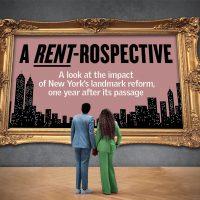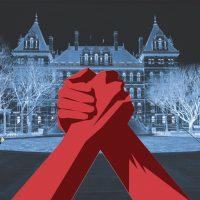When landlords groups challenged New York’s rent law, they expected to fail upwards. The next defeat in that plan is about to happen.
The Rent Stabilization Association and the Community Housing Improvement Program in 2019 challenged the state’s new rent stabilization law as unconstitutional. From the beginning, the groups had their sights on the U.S. Supreme Court, figuring they would take their lumps on the way there.
That has been the result so far, and they are now anticipating an imminent decision from the Second Circuit on their appeal of a lower court’s ruling against their lawsuit. If they lose, as seems likely, they plan to ask the Supreme Court to take up the case.
The high court’s rightward shift — the confirmation of Amy Coney Barrett gave conservatives a 6-3 edge — and its recent rulings have reinforced landlords’ thinking they have a better chance there than in the federal courts below it.
Their biggest hurdle is that the Supreme Court accepts only 100 to 150 of more than 7,000 cases that land on its doorstep annually and has previously declined to review rent control cases..
Andrew Pincus, a partner at Mayer Brown and the lead attorney for CHIP and RSA, said he believes they have a strong case and are prepared to move forward.
The suit alleges that New York’s rent stabilization law violates the Fifth Amendment, which includes a clause that bars taking of private property without “just compensation,” and the Fourteenth Amendment’s due process clause. A similar lawsuit filed by the Panagoulias family is also before the Second Circuit.
RSA President Joe Strasburg said he hopes that the Supreme Court will agree to hear the case and create “very strict guidelines of what is not permissible” under the takings clause.
Read more


On rent-stabilized tenants’ side, Judith Goldiner, an attorney at the Legal Aid Society, which is party to the case, called the lawsuit a “quioxitic campaign.”
In February, Second Circuit judges pushed back against the landlord groups’ comparisons of their case to a 2021 Supreme Court decision in favor of California employers who argued that a law requiring them to allow union organizers on their property represented an unconstitutional physical taking.
“I thought it went very poorly for them, which did not surprise me,” Goldiner said of the hearing. She added that she would be surprised if the Supreme Court takes up the case.
The case has a range of possible outcomes, given the many layers of the rent law. The primary changes passed by the state legislature and immediately signed into law by then-Gov. Andrew Cuomo were to remove the statute’s expiration date, to eliminate the primary ways to remove apartments from rent regulation, to end the 20 percent rent increase for vacant units, and to severely limit rent increases for building-wide or apartment improvements.
Few disagree that the changes reduced the value of rent-stabilized buildings. But whether that amounts to a taking is fiercely disputed. Supporters of the law say owners of such buildings were aware they were heavily regulated when they purchased them and that regulations could be altered. Opponents say the devaluation amounts to a taking without compensation.
But sales of regulated buildings have continued, with some buyers anticipating landlord-friendly changes to the law, or perhaps a victory in the courts, years down the line.